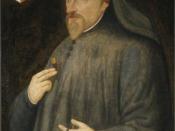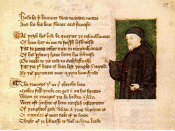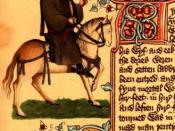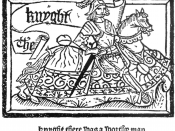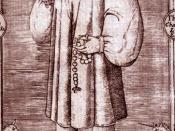The Unholy Prioress Canterbury Tales, by Geoffrey Chaucer, is a collection of tales that are told by a group of people who are on a religious pilgrimage to the Canterbury Cathedral. Among the characters included in the introductory General Prologue is a Nun, or a Prioress. Also known as Madame Eglantine, the Prioress is the "mother superior at her nunnery" (p.181, footnote 7). Portrayed as a delicate and well-mannered woman, she speaks French and has another nun and three priests traveling with her. Chaucer also notes that the Prioress has a coral trinket on her arm, and a gold brooch on her rosary, embossed with the Latin motto: "Amor vincit omnia" (line 162).
In the General Prologue, Chaucer gives fairly straightforward descriptions of the character of the Prioress. His presentation of Madame Eglantine's image is almost deceptively flawless, yet it is not genuine. Like most of the other pilgrims on this journey, the Prioress is vulnerable to subtle criticisms.
Although he praises her appearance and her prominence as a nun, Chaucer deliberately leaves a possible reading that would reveal her hypocrisy.
From lines 127 to 141, Chaucer hints that the Prioress is a prude and that her impeccable manners and her overwhelming effort for refinement are merely superficial and unnecessary. She exposes too much emphasis on her figure and too little on her religious dedications. Despite being a superior at her nunnery, the Prioress conducts herself in the fashion that exemplifies more of a lady from a wealthy family than of an ascetic nun. With the lines "[o]f smale houndes hadde she that she fedde [w]ith rosted flesh, or milk and wastelbreed," and "[o]f small coral aboute hir arm she bar [a] paire of bedes, gauded all with greene, [a]nd theron heeng a brooch of gold ful sheene," Chaucer implies that the nun is living a wealthy life full of valuable material goods, indicating her indulgence in worldly pleasures (lines 146-147, 158-160). Even the prints on her brooch that read "Love conquers all" is unclear whether that belong to godly love or secular love (p.182, footnote 1).
Chaucer then mocks her pretentiousness by sarcastically stating that "[s]he was so charitable and so pitous [that] she wolde weepe if that she saw a mous [c]aught in a trappe, if it were deed or bledde," which seems more like a gross overreaction (lines 144-155). Also, Chaucer points out that the Prioress' French was learned at the "scole of Stratford at the Bowe," and that the more elegant "Frenssh of Paris was to hire unknowe" (lines 125, 126). That Madame Eglantine is not as pious and genuine as she appears to be clearly suggests a sign of hypocrisy and immorality.
Chaucer, Geoffrey. "The Canterbury Tales: The General Prologue." The Norton Anthology of English Literature: The Major Authors, 7th Ed. Abrahms, M.H., Ed. New York: W.W.Norton, 2001
